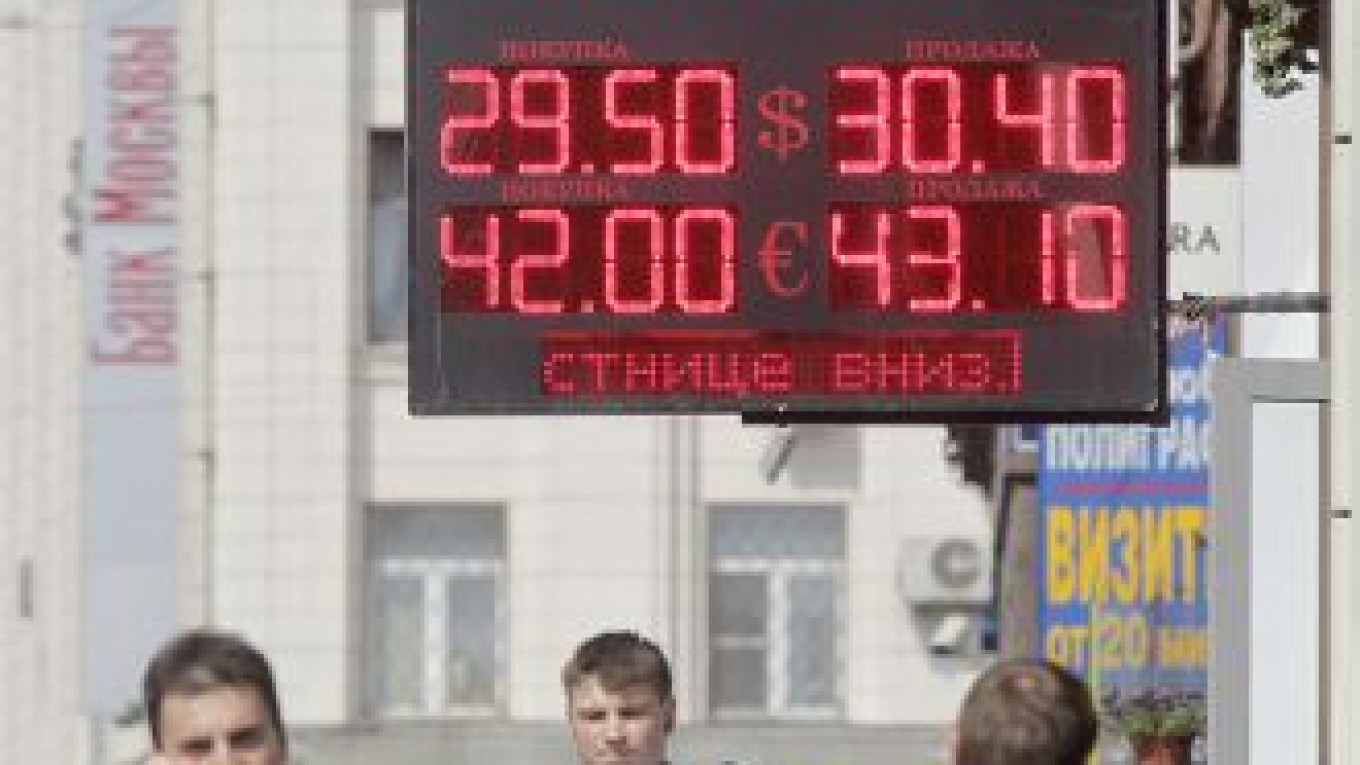Data from the Finance Ministry showed on Tuesday that banks were significantly more interested in getting government deposits, in what could be a measure to insulate themselves against the global turmoil on the markets.
As stock prices extended their decline in Moscow and the ruble rate fell markedly again, risks are growing for the banking system, which had to use billions of federal bailout dollars the last time the crisis hit in 2008.
Prime Minister Vladimir Putin said Tuesday that his government was on standby to inject more money into financial markets.
One of the channels the government used before to pump money into struggling lenders was to allow them to bid for the chance to hold unspent federal budget funds on their accounts, at interest. Banks borrowed this way extensively over some of the hardest months of the economic debacle in 2008 and 2009 — and they are looking closely at this measure again after the first-ever downgrade of the U.S. credit rating over the weekend stoked fears of another recession in the world's largest economy.
"The relevance of these deposits has increased dramatically," said Eugene Tarzimanov, senior analyst at Moody's in Moscow. "The appetite of banks for them has grown, which tells us about the nervousness on the market."
The latest bids from 16 banks totaled 94 billion rubles ($3.1 billion), while the Finance Ministry allotted only 40 billion rubles for the auction, the ministry's records showed Tuesday. Banks that offered an interest rate of at least 4.45 percent qualified to borrow the government money for slightly more than four months.
Banks also sought more money than was on offer in the three previous weekly auctions, starting July 19. The Finance Ministry doesn't disclose the bidders, but its requirements restrict the amount of eligible participants to about 30 top national lenders, Tarzimanov said.
Putin said the Finance Ministry and the Central Bank were studying the situation and were ready to respond to demand "in the near future."
VTB chief executive Andrei Kostin said Tuesday that the banking industry would suffer "no problems" even if the crisis worsens. The chief of the country's second-biggest bank made the statement at a meeting with Putin in Sochi.
Banks may need the money to safeguard themselves against several risks that include withdrawals of individual ruble-denominated deposits, as the national currency retreats against the dollar, Tarzimanov said.
A number of banks may take a hit from their equity holdings that have been losing value in recent days, he said, adding that state development bank Vneshekonombank, Gazprombank, UralSib and Ak Bars were the biggest stock investors among lenders as of the end of last year — the latest available records.
Risks also arise from foreign-currency loans to domestic companies that are not exporters and therefore could run into trouble servicing a debt that suddenly increased in ruble terms, Tarzimanov said.
There was no consensus Tuesday about exactly what drove the banks to augment their money supply.
Sergei Kazaryan, a banking analyst at Aton, said the reasons may have been unrelated to the turbulence on the global markets.
"Liquidity on the market is abundant," he said. "Banks have sufficient money."
Banks may have wanted to beef up their accounts to refinance any previous debt or make up for the slump in the inflow of other deposits, he said. Across the board, deposits increased by 0.3 percent in July, down from 2 percent the month before, he said.
The MICEX Index sank a tiny 0.1 percent to 1,497.81 at the close Tuesday, after dipping as much as 7.5 percent and gaining 1.1 percent during the day.
The dollar-denominated RTS closed down 2.9 percent at 1,610.22 for its sixth consecutive day of losses.
"There could be a big bounce — right now markets are very oversold and some people believe that they overreacted violently on the downside so they are overdue for some kind of rebound," said Bruce Bower, a Partner at Verno Capital.
The ruble slipped 2.8 percent versus the euro and 2.6 percent versus the dollar.
Russia's main export earner, the Urals blend of crude, remained almost unchanged, sliding a few cents to $101.78 a barrel.
U.S. Federal Reserve policymakers were scheduled to hold a meeting overnight Moscow time to discuss the consequences of the rating downgrade by Standard & Poor's.
Staff writer Howard Amos contributed to this report.
A Message from The Moscow Times:
Dear readers,
We are facing unprecedented challenges. Russia's Prosecutor General's Office has designated The Moscow Times as an "undesirable" organization, criminalizing our work and putting our staff at risk of prosecution. This follows our earlier unjust labeling as a "foreign agent."
These actions are direct attempts to silence independent journalism in Russia. The authorities claim our work "discredits the decisions of the Russian leadership." We see things differently: we strive to provide accurate, unbiased reporting on Russia.
We, the journalists of The Moscow Times, refuse to be silenced. But to continue our work, we need your help.
Your support, no matter how small, makes a world of difference. If you can, please support us monthly starting from just $2. It's quick to set up, and every contribution makes a significant impact.
By supporting The Moscow Times, you're defending open, independent journalism in the face of repression. Thank you for standing with us.
Remind me later.






